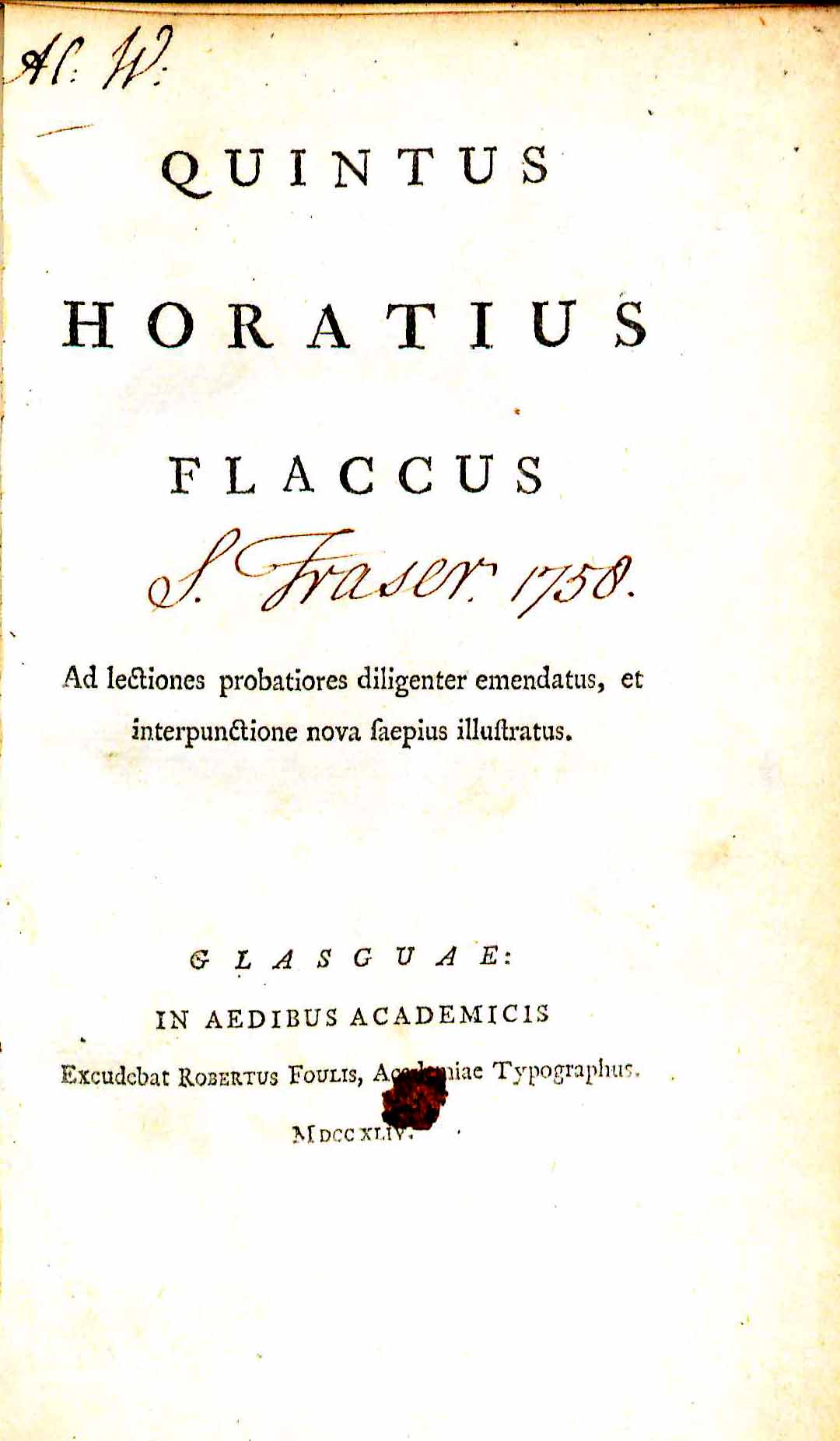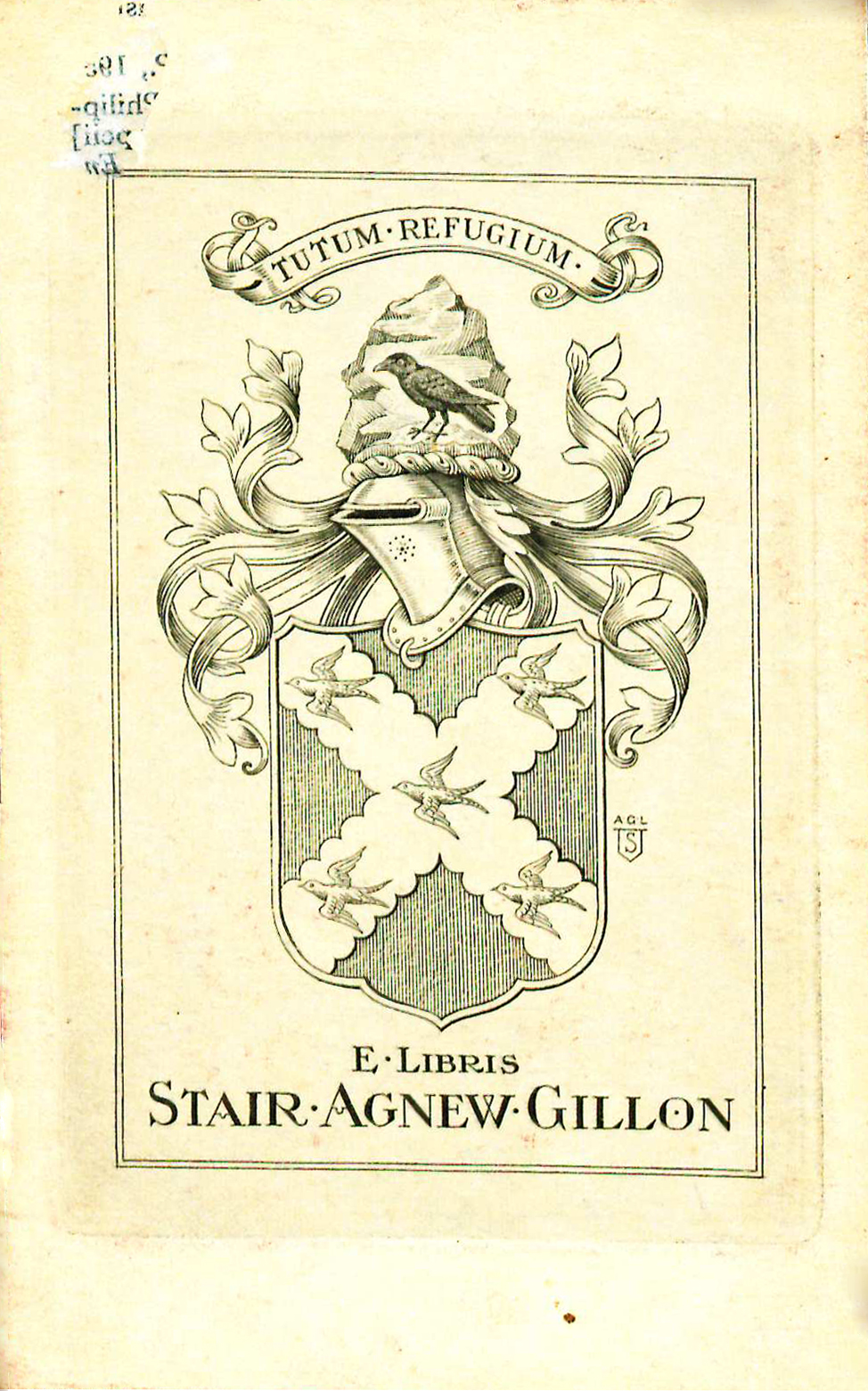Difference between revisions of "Quintus Horatius Flaccus"
m |
|||
| (11 intermediate revisions by 7 users not shown) | |||
| Line 4: | Line 4: | ||
{{BookPageInfoBox | {{BookPageInfoBox | ||
|imagename=HoraceQuintusHoratiusFlaccus1744.jpg | |imagename=HoraceQuintusHoratiusFlaccus1744.jpg | ||
| − | |link=https:// | + | |link=https://wm.primo.exlibrisgroup.com/permalink/01COWM_INST/g9pr7p/alma991023617149703196 |
|shorttitle=Quintus Horatius Flaccus | |shorttitle=Quintus Horatius Flaccus | ||
| − | |author=Horace | + | |author=[[:Category:Horace|Horace]] |
| − | |lang=Latin | + | |lang=[[:Category:Latin|Latin]] |
| − | |publoc=Glasguae | + | |publoc=[[:Category:Glasgow|Glasguae]] |
| − | |publisher=In aedibus academicis, excudebat | + | |publisher=In aedibus academicis, excudebat Robertus Foulis |
|year=1744 | |year=1744 | ||
|pages=[4], 221, [3] | |pages=[4], 221, [3] | ||
|desc= (16 cm.) | |desc= (16 cm.) | ||
| + | |shelf=J-4 | ||
}}{{BookPageBookplate | }}{{BookPageBookplate | ||
|imagename=QuintusHoratiusFlaccus1744Bookplate.jpg | |imagename=QuintusHoratiusFlaccus1744Bookplate.jpg | ||
|display=left | |display=left | ||
|caption=Bookplate of Stair Agnew Gillon, front pastedown. | |caption=Bookplate of Stair Agnew Gillon, front pastedown. | ||
| − | }}[ | + | }}[[wikipedia:Horace|Horace Quintus Horatius “Horace” Flaccus]] (65 BCE–8 CE) was a Roman poet about whom modern scholars actually have a good deal of information due to his own testimony and a biography by [[wikipedia:Suetonius|Suetonius]].<ref>[http://www.oxfordreference.com/view/10.1093/acref/9780199548545.001.0001/acref-9780199548545-e-1556 "Horace”] in ''The Oxford Companion to Classical Literature'', ed. by M.C. Howatson (Oxford: Oxford University Press, 2011).</ref> He is unique in that all of his published works survive to this day.<ref>Ibid.</ref> Horace’s father was a freeman (a former slave) who became a successful public auctioneer, enabling Horace to go to Rome and Athens for an upper-class education.<ref>[http://www.oxfordreference.com/view/10.1093/acref/9780192801463.001.0001/acref-9780192801463-e-1078 "Horace"] in ''Oxford Dictionary of the Classical World'', ed. by John Roberts (Oxford: Oxford University Press, 2007).</ref> Horace was in Athens when the Roman civil war broke out after [[wikipedia:Julius Caesar|Julius Caesar’s]] assassination in 44 BCE, and from there he joined [[wikipedia:Marcus Junius Brutus|Brutus’]] army as a military tribune from 44 to 41 BCE when (he says) he ran away from the [[wikipedia:Battle of Philippi|Battle of Philippi]]. He “counted himself lucky to be able to return to Italy, unlike many of his comrades-in-arms,” and was accepted into a circle of writers including [[wikipedia:Gaius Maecenas|Maecenas]], who later gave him a farm thereby securing his financial position. This security gave Horace leisure time to work on poetry (which was vastly impacted by the Sabine region in which his farm was located) and maintain his personal freedom. He declined close relationships that might commit him to others, including an influential post offer by the [[wikipedia:Augustus|Emperor Augustus]].<ref>Ibid.</ref> Though Horace treasured his privacy, he maintained a close friendship with Maecenas for thirty years and died several months after him without having ever married. <ref>"Horace” in ''The Oxford Companion to Classical Literature''.</ref><br/> |
<br/> | <br/> | ||
In the 30s BCE, Horace wrote and published iambic poetry collectively known as the ''Epodes'' and the ''Satires'', and then turned to lyric poetry referred to as his ''Odes''. It is for the “perfection of form” and “depth and detail of his self-portraiture throughout” these poems that Horace secured his “position as one of the greatest of Roman poets.”<ref>Ibid.</ref> His poems often addressed the key ancient topic of friendship, as well as his country and countryside, all of which he greatly loved. Horace was so well respected and his works appreciated that his ''Odes'' were used in schools before his death. He is still “the most quoted of Latin poets.”<ref>Ibid.</ref><br/> | In the 30s BCE, Horace wrote and published iambic poetry collectively known as the ''Epodes'' and the ''Satires'', and then turned to lyric poetry referred to as his ''Odes''. It is for the “perfection of form” and “depth and detail of his self-portraiture throughout” these poems that Horace secured his “position as one of the greatest of Roman poets.”<ref>Ibid.</ref> His poems often addressed the key ancient topic of friendship, as well as his country and countryside, all of which he greatly loved. Horace was so well respected and his works appreciated that his ''Odes'' were used in schools before his death. He is still “the most quoted of Latin poets.”<ref>Ibid.</ref><br/> | ||
<br/> | <br/> | ||
| − | This work contains Horace’s songs, ''Epodes'', ''Sermons'', ''Epistles'', and ''Ars Poetica''. It was published in 1744 by | + | This work contains Horace’s songs, ''Epodes'', ''Sermons'', ''Epistles'', and ''Ars Poetica''. It was published in 1744 by Scottish publishers Robert and Andrew Foulis. |
==Evidence for Inclusion in Wythe's Library== | ==Evidence for Inclusion in Wythe's Library== | ||
| Line 29: | Line 30: | ||
Octavo, bound in late nineteenth century full crimson morocco gilt. Contains the initials "H. W." and the signature "S. Fraser, 1758" on the title page. Includes the bookplate of Stair Agnew Gillon with the Latin motto "Tutum refugium" (A safe refuge.) on the front pastedown. Purchased from G.W. Stuart, Jr. | Octavo, bound in late nineteenth century full crimson morocco gilt. Contains the initials "H. W." and the signature "S. Fraser, 1758" on the title page. Includes the bookplate of Stair Agnew Gillon with the Latin motto "Tutum refugium" (A safe refuge.) on the front pastedown. Purchased from G.W. Stuart, Jr. | ||
| − | + | Images of the library's copy of this book are [https://www.flickr.com/photos/wolflawlibrary/albums/72157637698834153 available on Flickr.] View the record for this book in [https://wm.primo.exlibrisgroup.com/permalink/01COWM_INST/g9pr7p/alma991023617149703196 William & Mary Online Catalog] | |
| + | |||
| + | ==See also== | ||
| + | *[[George Wythe Room]] | ||
| + | *[[Jefferson Inventory]] | ||
| + | *''[[Oeuvres d'Horace|Oeuvres d'Horace en Latin et en Francois, avec des Remarques Critiques et Historique]]'' | ||
| + | *''[[Poetical Translation of the Works of Horace|A Poetical Translation of the Works of Horace]]'' | ||
| + | *''[[Q. Horatii Flacci Epistolae ad Pisones, et Augustum]]'' | ||
| + | *''[[Q. Horatii Flacci Opera]]'' | ||
| + | *[[Wythe's Library]] | ||
| + | |||
==References== | ==References== | ||
<references/> | <references/> | ||
[[Category:George Wythe Collection at William & Mary's Wolf Law Library]] | [[Category:George Wythe Collection at William & Mary's Wolf Law Library]] | ||
| + | [[Category:Horace]] | ||
[[Category:Latin Literature]] | [[Category:Latin Literature]] | ||
| + | [[Category:Thomas Jefferson Randolph's Books]] | ||
[[Category:Titles in Wythe's Library]] | [[Category:Titles in Wythe's Library]] | ||
| + | |||
| + | [[Category:Glasgow]] | ||
| + | [[Category:Latin]] | ||
Latest revision as of 16:01, 28 October 2021
by Horace
| Quintus Horatius Flaccus | |
|
Title page from Quintus Horatius Flaccus, George Wythe Collection, Wolf Law Library, College of William & Mary. | |
| Author | Horace |
| Published | Glasguae: In aedibus academicis, excudebat Robertus Foulis |
| Date | 1744 |
| Language | Latin |
| Pages | [4], 221, [3] |
| Desc. | (16 cm.) |
| Location | Shelf J-4 |
Horace Quintus Horatius “Horace” Flaccus (65 BCE–8 CE) was a Roman poet about whom modern scholars actually have a good deal of information due to his own testimony and a biography by Suetonius.[1] He is unique in that all of his published works survive to this day.[2] Horace’s father was a freeman (a former slave) who became a successful public auctioneer, enabling Horace to go to Rome and Athens for an upper-class education.[3] Horace was in Athens when the Roman civil war broke out after Julius Caesar’s assassination in 44 BCE, and from there he joined Brutus’ army as a military tribune from 44 to 41 BCE when (he says) he ran away from the Battle of Philippi. He “counted himself lucky to be able to return to Italy, unlike many of his comrades-in-arms,” and was accepted into a circle of writers including Maecenas, who later gave him a farm thereby securing his financial position. This security gave Horace leisure time to work on poetry (which was vastly impacted by the Sabine region in which his farm was located) and maintain his personal freedom. He declined close relationships that might commit him to others, including an influential post offer by the Emperor Augustus.[4] Though Horace treasured his privacy, he maintained a close friendship with Maecenas for thirty years and died several months after him without having ever married. [5]
In the 30s BCE, Horace wrote and published iambic poetry collectively known as the Epodes and the Satires, and then turned to lyric poetry referred to as his Odes. It is for the “perfection of form” and “depth and detail of his self-portraiture throughout” these poems that Horace secured his “position as one of the greatest of Roman poets.”[6] His poems often addressed the key ancient topic of friendship, as well as his country and countryside, all of which he greatly loved. Horace was so well respected and his works appreciated that his Odes were used in schools before his death. He is still “the most quoted of Latin poets.”[7]
This work contains Horace’s songs, Epodes, Sermons, Epistles, and Ars Poetica. It was published in 1744 by Scottish publishers Robert and Andrew Foulis.
Evidence for Inclusion in Wythe's Library
Listed in the Jefferson Inventory of Wythe's Library as "Horatius. Foulis. 12mo." and given by Thomas Jefferson to his grandson Thomas Jefferson Randolph. The Foulis Press printed one duodecimo version of the works of Horace in Latin, the "immaculate edition" of 1744.[8] Both George Wythe's Library[9] on LibraryThing and the Brown Bibliography[10] include the 1744 edition. The Wolf Law Library purchased a copy of the same edition.
Description of the Wolf Law Library's copy
Octavo, bound in late nineteenth century full crimson morocco gilt. Contains the initials "H. W." and the signature "S. Fraser, 1758" on the title page. Includes the bookplate of Stair Agnew Gillon with the Latin motto "Tutum refugium" (A safe refuge.) on the front pastedown. Purchased from G.W. Stuart, Jr.
Images of the library's copy of this book are available on Flickr. View the record for this book in William & Mary Online Catalog
See also
- George Wythe Room
- Jefferson Inventory
- Oeuvres d'Horace en Latin et en Francois, avec des Remarques Critiques et Historique
- A Poetical Translation of the Works of Horace
- Q. Horatii Flacci Epistolae ad Pisones, et Augustum
- Q. Horatii Flacci Opera
- Wythe's Library
References
- ↑ "Horace” in The Oxford Companion to Classical Literature, ed. by M.C. Howatson (Oxford: Oxford University Press, 2011).
- ↑ Ibid.
- ↑ "Horace" in Oxford Dictionary of the Classical World, ed. by John Roberts (Oxford: Oxford University Press, 2007).
- ↑ Ibid.
- ↑ "Horace” in The Oxford Companion to Classical Literature.
- ↑ Ibid.
- ↑ Ibid.
- ↑ Philip Gaskell, A Bibliography of The Foulis Press, 2nd ed. (Winchester, Hampshire, England : St Paul's Bibliographies, 1986), 95.
- ↑ LibraryThing, s. v. "Member: George Wythe" accessed on February 28, 2014.
- ↑ Bennie Brown, "The Library of George Wythe of Williamsburg and Richmond," (unpublished manuscript, May, 2012) Microsoft Word file. Earlier edition available at: https://digitalarchive.wm.edu/handle/10288/13433

